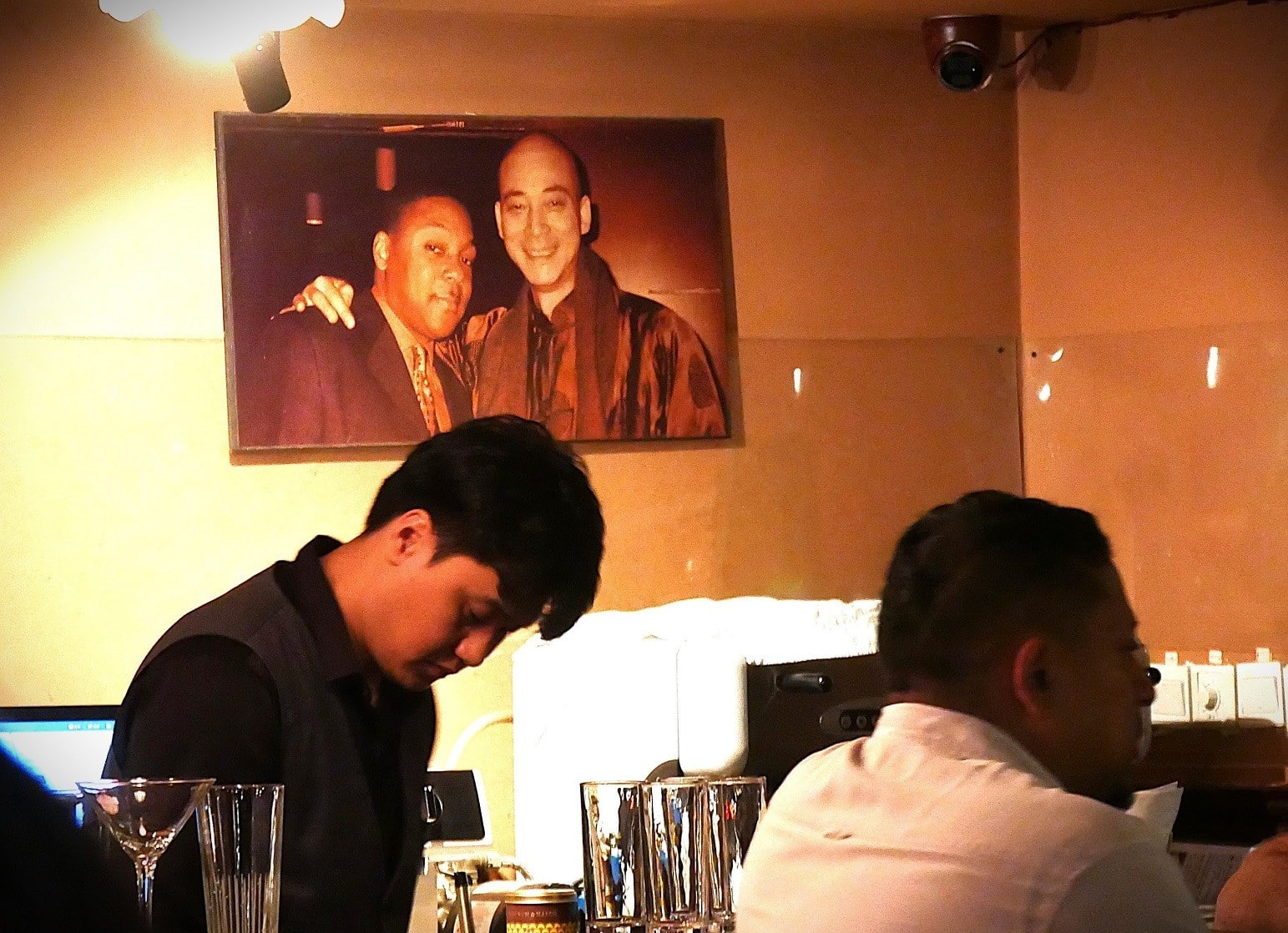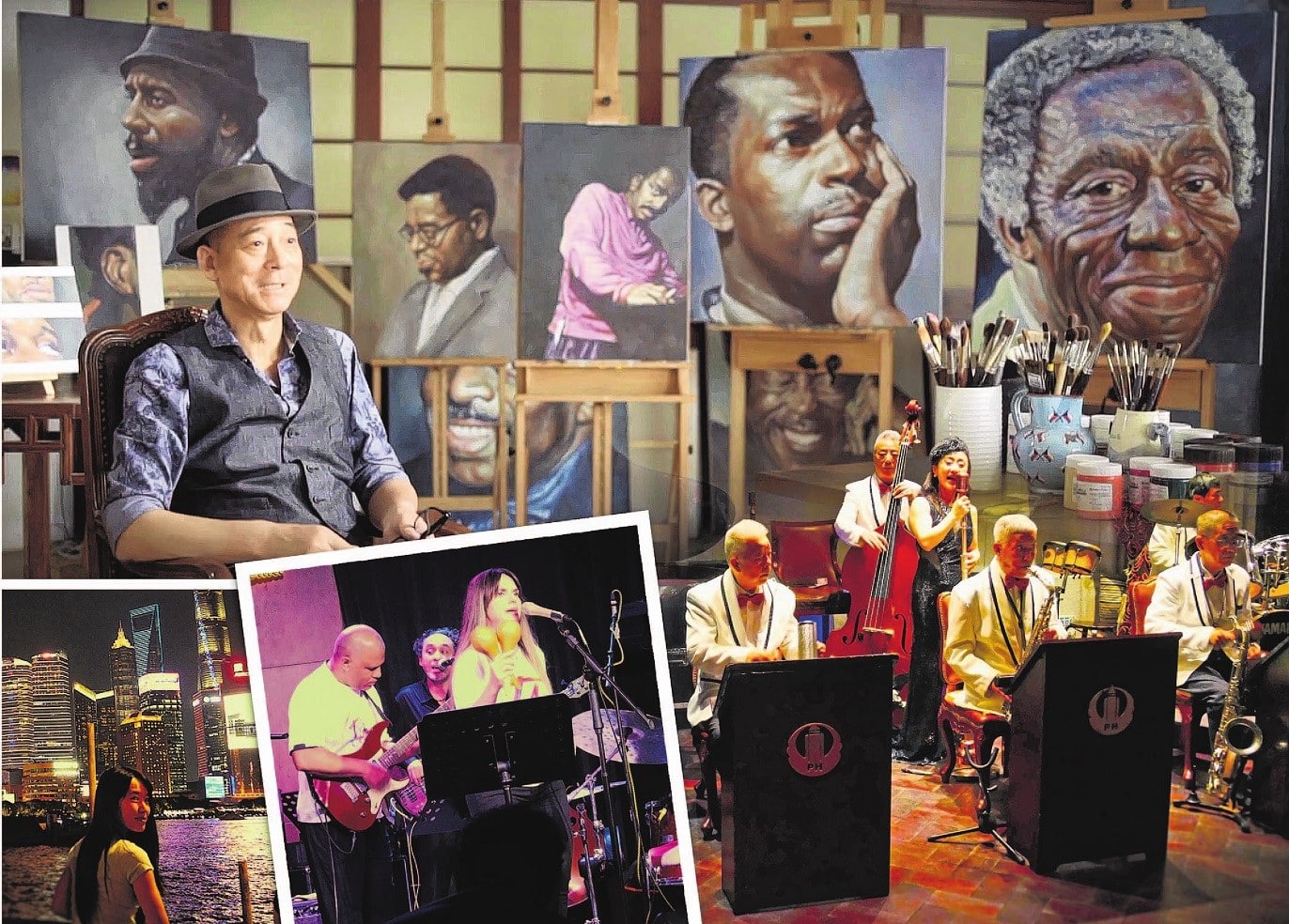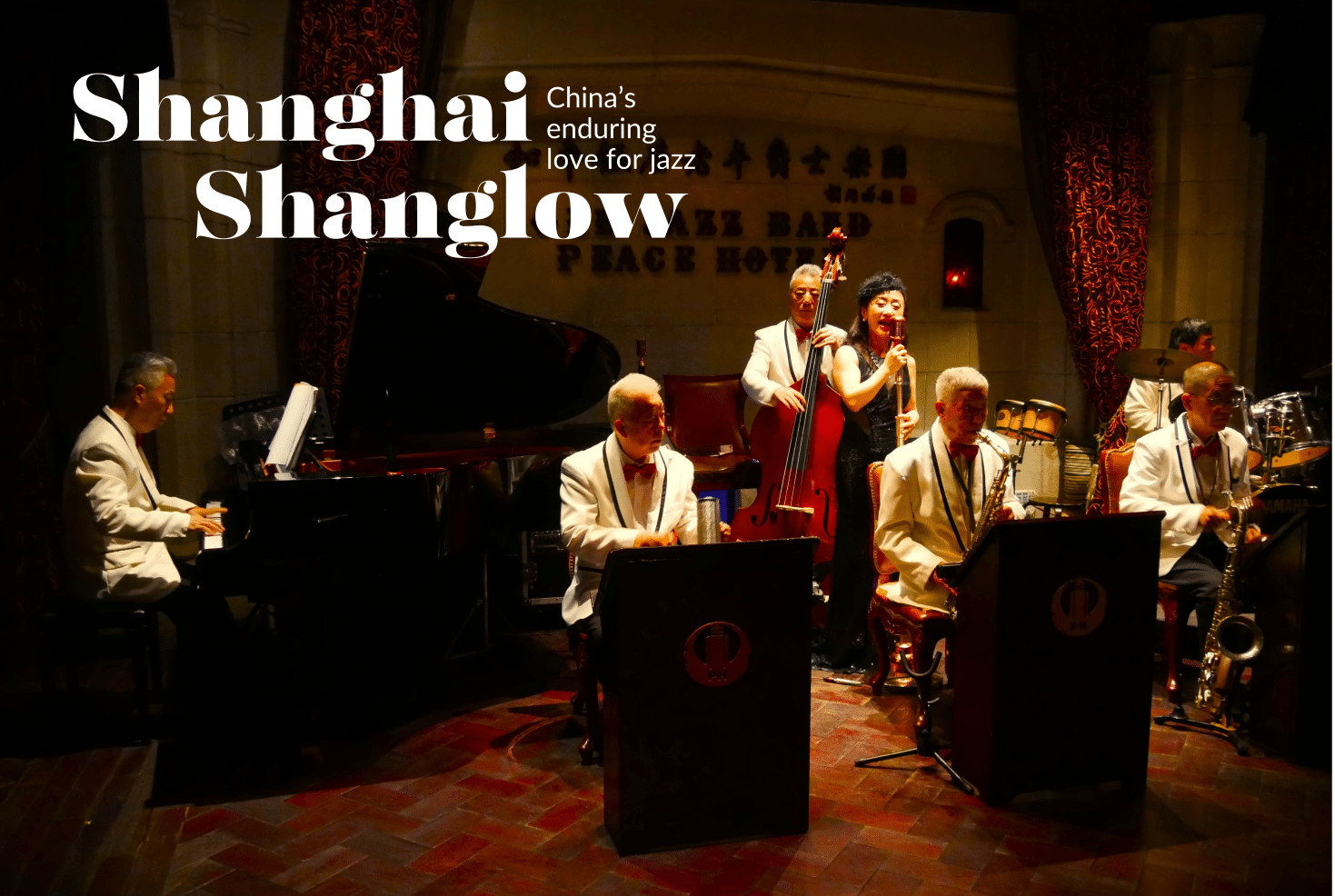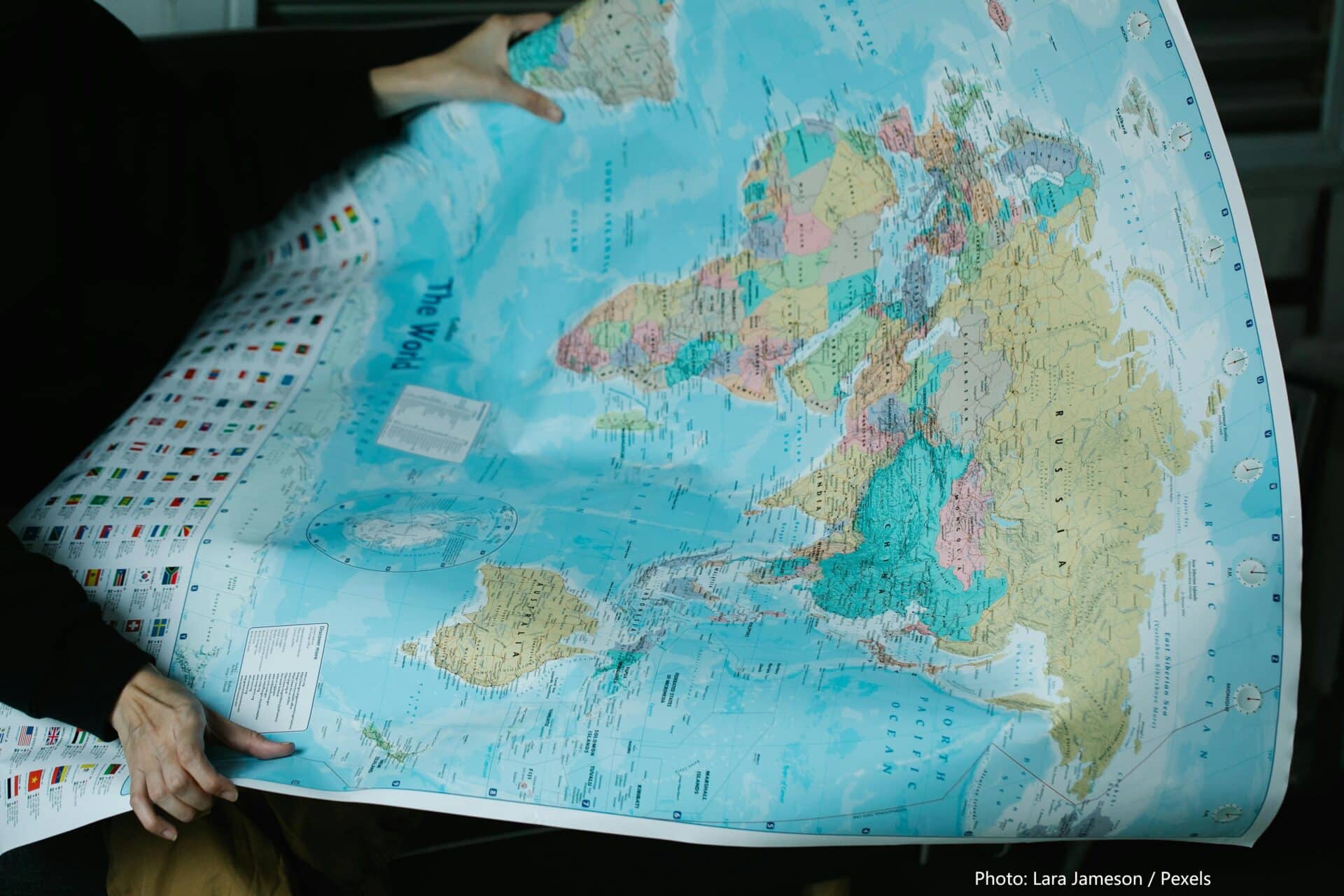Shanghai Shanglow
This article by Bruce Munro was originally published on odt.co.nz on 3 Aug 2024.
A century ago, Shanghai was the thrumming hub of jazz in Asia. Bruce Munro recently spent time in the Pearl of the Orient searching for that city’s 2024 incarnations of swing, bebop and all that jazz.
I have never met Dongfu Lin. But I have spent some enchanted evenings in his living room.
In fact, it was while sitting in Dongfu’s “lounge” on my last evening in Shanghai that I finally made contact with his wife Songlan.
“Ni hao Songlan,” I typed on WeChat.
“I’m at the House of Blues & Jazz … Will you or your husband be here tonight?”
Half an hour later, a response popped up.
“Sorry. Tonight we are busy [with] other things.”It is this sort of “almost” connection that has dogged my whole jazz journey in Shanghai. The voice of my wife, a gifted jazz musician, echoes in my head – “It’s all about timing”. Clearly, mine is off. But that’s OK; my musical career might have peaked at Form 1 recorder orchestra, but I am adept at a different jazz virtue, improvisation – try something new, see what sticks; you can always return to the melody after a few more bars.
“Of course, not a problem,” I messaged back to Songlan.
“Could I call you or Dongfu sometime? … There is no need to answer this evening. Have a good night.”
Shanghai, shanglow, won’t you call me and tell me …
I can’t pinpoint the first date that led to my love affair with jazz. Maybe it grew naturally from youthful francophilia – jazz just always seemed so very cool. I was certainly aware of jazz’s allure on a humid night in 2012, mesmerised by a beautiful Malaysian jazz chanteuse and her pianist father performing duets in an open-sided bar on a street corner in melting-pot Malacca. The pull of jazz was undeniable a year later when, wandering Shanghai’s former foreign concession The Bund, I was drawn into a hotel by the unexpected sound, and then astonishing sight, of the white-suited, octogenarian, Peace Hotel Jazz Band. A few years later, the deal was sealed when I became spouse and roadie to jazz singer and pianist, Annemarie Nelson.
So, when an opportunity arose this year to return to China, I quickly began looking for a reason to include jazz on the itinerary. Little research was needed to reveal Shanghai, 100 years ago, was in fact the thrumming hub of jazz in Asia. Discovering what had happened since then, and whether the city still had an active jazz scene, was added to the list of reasons for the trip.
The only missing element was a New Zealand, and preferably Otago, connection. Even the hint of a connection remained elusive until, less than a week before departure, I contacted Umar Zakaria, the Singapore-born, Wellington-based, award-winning jazz bassist and composer who has performed in Dunedin several times. A few hours later, he replied with: “The one place I can tell you about in Shanghai is the House of Blues & Jazz. My friend Lavia is the owner’s daughter … I met her in Berlin and at one point we were discussing my band playing there.”
It was enough to go on; I was on my way.
Shanghai, at night, goes off. It’s Sunday, my first evening in China in 11 years. Half of the city’s 26 million residents seem to be promenading on The Bund’s impressive, colonial-era river-front backdropped by the city’s kaleidoscopic, skyscraper light display.
The crowds are good humoured, the traffic well behaved and the surveillance cameras ubiquitous. Touts still offer a full range of services, but are fewer and less strident than a decade ago, and the streets are uncannily litter-free. It is a setting for nights beyond forgetting.
Less than a block back from The Bund, on Fuzhou Rd, gothic neon above a brick portico announces the House of Blues & Jazz. A sign on the door advertises a 9.30pm start, so I decide to head first to the Fairmont Peace Hotel, three blocks north along the waterfront.
From the hotel’s vaulted foyer, dominated by a lit, glass dove – wings pinned back as though swooping on prey rather than ushering in peace – I can hear the music of a 1930s big band. My excitement rises as I wonder whether they will still be the vintage players I saw in 2013. Inside the bar, the musicians are as white-haired and the tunes as bright as if I’d popped back in after 10 minutes, not 10 years.

There is no cover charge; costs are recouped by the CN¥150 (NZ$35) cocktails. Sipping a sweet Peace Cocktail – whisky, cherry, brandy, osthmanus wine – I hope the price tag means the old-timers, average age 82, are well-reimbursed for their nightly, six-hour gigs.
Their extensive repertoire covers jazz standards and jazz adaptations of Chinese folk songs. Instrumentals are interspersed with sets sung by a female singer in a distinctive Shanghainese style. They are proficient exponents of what has been termed “warm jazz”. This is the sound of Shanghai jazz from its earliest days, being performed by some who remember China as it was before the Cultural Revolution.
It will be US jazz historian Dr Eugene Marlow, after I return to New Zealand, who will fill in many of my knowledge gaps. Dr Marlow will answer my questions and give access to his award-winning 2022 documentary, Jazz in China, based on his 2018 book of the same name.
Jazz took off in Shanghai in the 1920s, epitomising a new world young Chinese intellectuals were keen to experience. Venues like the Paramount attracted white and African American jazz musicians, including Teddy Weatherford, Whitey Smith, Valaida Snow and Jack Carter. In the 1930s, Chinese composers such as Li Jinhui began mixing jazz styles with Chinese folk music.
A decade of regional and global conflict, from 1937, was followed by a brief, bright window for China until communist party leader Mao Zedong ushered in the repressive Cultural Revolution.
“When China was liberated from the Japanese after World War 2, Shanghai began to blossom,” Peace Hotel Jazz Band saxophonist Sun Ji Bing told Marlow on Jazz in China.
“But in 1953 all the ballrooms were suddenly closed down and I lost my job.”
“We weren’t allowed to listen to any music, not even classical music. We were only supposed to sing ‘red songs’,” Peace Hotel double bassist Li Mingkang added.
When Mao died in 1976, he was replaced as General Secretary of the Chinese Communist Party by Deng Xiaoping who began re-connecting China to the world, using music as a vital bridge between East and West. In 1979, the Boston Philharmonic Orchestra played to packed stadiums in Shanghai and Beijing. Later the same year, the Peace Hotel Jazz Band reformed.
It is after 10pm when I pay a CN¥50 cover charge and enter the House of Blues & Jazz. Dark wood, heavy curtains and a well-stocked bar convey a “speak-easy” vibe. A mix of local and expat’ patrons are enjoying a talented and equally cosmopolitan three-piece band: Aleksei, from Russia, on piano, Paul, of the United Kingdom, on bass and vocals, and Guillaume, of France, on drums. They are in the groove, moving seamlessly from melody to improv’ solos, trading and back to the melody. In the crowd, young people sit in rapt attention or bob their heads in time, while older customers listen or talk. At the end of each tune, applause is generous.
Behind the bar is a large sepia-tone photo of a man with his arm around the shoulder of jazz trumpeter and composer Wynton Marsalis. The bartender confirms it is a 20-year-old photo of the venue’s owner Dongfu. Will he be coming in? Not tonight. Not a problem, I tell myself; I will be back in a week for another try. I settle in to enjoy the music. Low is the moon when we say adios.
The following Saturday night – having spent the intervening days in Beijing and Hangzhou, interviewing foreign policy specialists and health researchers, watching robot guard dogs in action and riding in an autonomous taxi – I am back in Shanghai at dusk, sensing the breathless hush of evening that trembles on the brink of a lovely song.
First stop of the night is Jazz at Lincoln Centre, Shanghai – the Chinese off-shoot of the New York jazz venue headed by the musician I’ve seen in the photo with Dongfu.
Finding the venue, a block west of the Peace Hotel, is not easy. Twice, I walk past an unremarkable door before guessing it must be the entrance. Inside, I pay a CN¥168 cover charge, am escorted through an empty shopping arcade to a lift, and ascend to be disgorged in front of the chic Jazz at Lincoln Centre, Shanghai. Bossa rhythms reach out to draw me in. Inside, a five-piece South American band is taking willing punters on a musical tour of their continent. They are professional, tight, entertaining and ably wrangled by a multi-lingual, multi-instrumental, lead singer. Speaks Latin, that satin doll.
This is one of the better-known jazz venues, but only one of many, in Shanghai.
I’ll find out from Dr Marlow that jazz has gone from strength to strength throughout China, and nowhere more so than in this, the Pearl of the Orient.
In 1981, two years after the Peace Hotel Jazz Band reformed, jazz musicians Willie Ruff and Dwike Mitchell performed at the Shanghai Conservatory. The first foreign jazz band to play in China in more than a quarter of a century, they startled and excited the musically able audience with their improvisation of jazz standards and Chinese folk tunes.
Leading the jazz rebirth in China, from the mid-1980s, were the likes of Shanghai bass player Ren Yuqing, composer Liu Sola and China’s “father of jazz”, Beijing saxophonist Liu Yuan.
There was an official crackdown on Western music in the wake of the bloody suppression of the 1989 Tiananmen Square protests but jazz, because it steered clear of politics, was allowed to flourish.

However, while the lyrics are normally apolitical, the soul of jazz – born amidst the injustice and hardship of early-1900s African American life in the south of the United States – swings to the tune of freedom, spontaneity and collaboration.
As jazz-piano prodigy and composer A Bu says on Jazz in China: “Jazz doesn’t exist on paper. It exists in the dialogue between musicians.”
Among other notable Chinese jazz musicians of the past few decades are Bu’s former teacher pianist Kong Hongwei, vocalist Coco Zhao, trumpeter Xiaochuan Li, vocalist Jasmine Chen (who appears in Crazy Rich Asians), pianist Xia Jia, saxophonist Gaoyang Li, guitarist Xiongguan Zhang and vocalist Mandy Chan.
Today, there are jazz venues in most larger cities in China, including, in Shanghai, the Heyday Vintage Jazz Lounge, House of Blues & Jazz, JZ Club, Blue Note, Fairmont Peace Hotel, Haifang Lu and Jazz at Lincoln Centre.
Late evening, I’m back in the House of Blues & Jazz. I ask the barman for a drink that rattles when you lug it and take a bar stool near the low stage. Performing is Stone, a psychedelic blues band fronted by Dave Stone, of Sydney, and supported by other able expat’ musicians and two talented locals on trumpet and harmonica.
In a set break, Dave provides contact details for Songlan, Dongfu’s wife. I fire off my WeChat question, get a reply in the negative by the end of the next set, respond with my half-hopeful request for a “sometime” phone call and settle in to nurse my drink while the music nurses a little sweetness down in my soul.
Blues is the mother of jazz; early jazz giants such as King Oliver, Jelly Roll Morton and Louis Armstrong used blues songs as a template for improvisation and as the foundation for many of their well-known tunes.
What I don’t know in this moment, is that sitting, relaxing in this comfortable space is exactly how Dongfu wants me to feel.
I will hear that from him, via his Berlin-based artist daughter Lavia, after I return to New Zealand.
Back in Dunedin, I will send questions for him to his wife and will receive answers a day later through his daughter who assures they are her father’s translated responses, thoughts and feelings.
Dongfu, a rebellious teenager during the Cultural Revolution, was captivated by the music he heard on a few blues and jazz records that escaped detection by the Red Guards. He also heard elderly Shanghai residents talk about yaobeiyue (swing music), as they called what later came to be known as jueshi (jazz).
He feels lucky to have fallen in love with jazz and blues at a young age, identifying with the hardship the music springs from.
“I never feel lonely when I’m listening to this music,” he says.
Dongfu wanted to become an artist, a painter, but was sent to work as a house repairer, which he did for nine years.
During the 1980s, he heard more jazz through foreign students he was teaching to speak Chinese. He also began dubbing foreign films and became fascinated by scenes set in jazz and blues bars.
His acting career has spanned voice (he has dubbed more than 500 films, including being the Chinese voice of Darth Vader), stage and screen. In 2019, he was made a Knight of the Order of Arts and Letters by the French government, for his contribution to the global expression of French arts.
The genesis of the House of Blues & Jazz was regular house parties Dongfu and Songlan held for foreign students in their tiny apartment, where they enjoyed food and drink while listening to music, talking and laughing.
In 1995, the House of Blues & Jazz opened, seeking to recreate that music-saturated, homely environment for Shanghai locals and visitors. It has been doing that for almost a quarter of a century, but in four different locations; the latest, since 2008, on Fuzhou Rd.
“The House has been a big living room for the loyal music lovers and … musicians from all over the world … My place is your place.”
I feel it, but sitting in his “living room” I don’t yet know it. In fact, right now, I ain’t got no firm contacts, ain’t got no answers, and quite likely I ain’t got no class. But hey, what have I got? I got my ears, I got my eyes, I got my smile, I’ve got this moment – yes, I’ve got life.












 MENU
MENU
